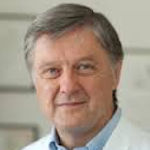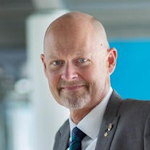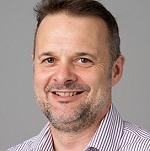International Advisory Board
Professor Tony Cass, Imperial College, UK
Tony Cass is Professor of Chemical Biology in the Department of Chemistry and Institute of Biomedical Engineering. He trained originally as a chemist with degrees from the Universities of York and Oxford. His research interests are in the field of analytical biotechnology both in the use of molecular engineering and design to produce new reagents for biosensors and bioanalysis and in microfabrication for device structures. He pioneered the use of synthetic electron transfer mediators for enzyme biosensors and his work in this area led to the development of the first electronic blood glucose measuring system, commercialised by MediSense Inc. (now part of Abbott Diagnostics), and the award of the Royal Society's Mullard Medal (along with Professor HAO Hill FRS and Dr MJ Green) and a Chemical Landmark Award (with Professor HAO Hill FRS and Dr Graham Davis).

Professor Kristina Djinović-Carugo, University of Vienna, Austria
Kristina Djinović-Carugo is Professor of Structural Biology at University of Vienna and Head of research group Structural Biology of Cytoskeleton. Professor Kristina, joined the Max F. Perutz Laboratories in 2004, and since 2009 heads the Department for Structural and Computational Biology. She also leads the Center for Optimised Structural Studies, a joint venture between University of Vienna, Vienna Campus Biocenter Facilities, the Institute of Molecular Pathology and BIOMIN, and is vice-speaker of the International PhD Program “Integrative Structural Biology”, a cooperation of the University of Vienna, the Medical University of Vienna and the Institute of Molecular Pathology. Professor Kristina’s group focuses on structural biology of the cytoskeleton. Muscle proteins, in particular the striated muscle sarcomere compartment Z-disk, have a striking number of protein-protein interactions and are of special interest to her and her group.
Professor Ryszard Frackowiak, University of Lausanne, Switzerland - Chairman
Ryszard Frackowiak was until recently a Director of Department of Clinical Neuroscience, Head of Service of Neurology, CHUV University Hospital. Professor Richard Frackowiak was studied medicine at the University of Cambridge where he first became interested in the neurosciences. His research interest is the functional and structural architecture of the human brain in health and disease. He has pioneered the development and introduction of positron emission tomography and magnetic resonance imaging and prosecuted a research programme dedicated to understanding the organisation of human brain functions, but his focus has been on plasticity and mechanisms for functional recuperation after brain injury and the patho-physiology of cerebral neurodegenerations. Most recently he have introduced computerised image classification for diagnosis and treatment monitoring into clinical science.
Professor Bill Hansson, Max Planck Society, Germany
Bill Hanson is Vice president of the Max Planck Society. Professor Hansson worked as postdoc at the University of Arizona and returned 1990 to a junior professorship in Lund. In 1992 he became Associate Professor and from 2000 until 2001 he was a Professor for Chemical Ecology at Lund University (2000). From 2001 he was Professor and Head of the Chemical Ecology department at the Swedish University of Agricultural Sciences (SLU) in Alnarp, Sweden, until he was appointed Director and Scientific Member at the Max Planck Institute for Chemical Ecology in Jena, Germany in 2006. He is head of the Department of Evolutionary Neuroethology. In 2010 the Friedrich Schiller University in Jena appointed him Honorary Professor. Hansson’s research focuses on neuroethological aspects of insect-insect and insect-plant interactions.
Dr Tim Hammonds, Cancer Research Technology Discovery Laboratories, UK
Tim Hammonds is Deputy Director of Discovery at Cancer Research Technology Discovery Laboratories in London. Tim has been in his current role at CRT-DL since April 2014. He leads multiple aspects of translational drug discovery and has strategic responsibility for the Cancer Biology Advisory Board and the design, planning, negotiation and management of multi-site academia-industry alliances. During his 16 years at CRT, Tim has been central to establishing our small molecule drug discovery capabilities. Tim joined CRT-DL after 5 years postdoctoral enzymology research at the University of Leicester. He has a degree in Pharmacy and a PhD in pharmaceutical chemistry and microbiology from the University of Nottingham.
Professor Christine Helen Foyer






